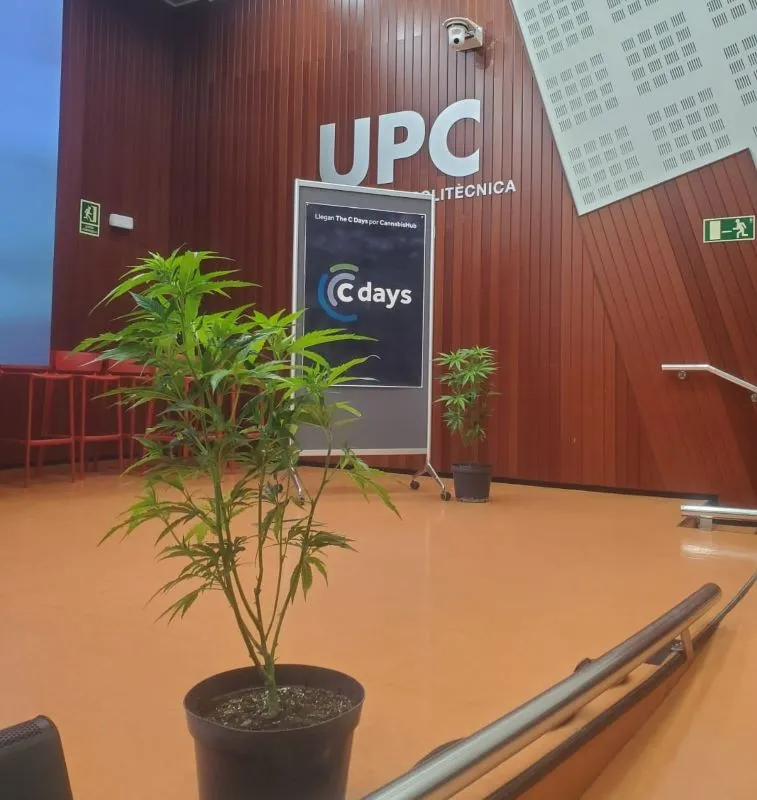Increasing patient access to cannabis-based medicines
Spannabis 2023 – Focus on cannabis regulations to help move the industry forward
Cannabinoids

Mar 22, 2023 | Published by Alberto Sainz
Cannabinoids
Alberto Sainz is a behavorial scientist with a background in psychology and neurosciences and specialized in psychopharmacology of cannabis. Alberto is based in Barcelona, he is part of the Broughton Human Studies team and attended Spannabis earlier in March. Here are his impressions of the event.
As happens every year, the cannabis industry got excited to travel to Barcelona for Spannabis week. Spannabis enables not only cannabis companies to exhibit, but also allows the most influential people from the cannabis sector to meet, including policymakers, medical cannabis patients, scientists, artists, and activists. Spannabis is not just an event anymore, it is a full week of opportunities to discuss cannabis regulations, to share the latest technology, to learn about new discoveries and, of course, to make new contacts that might lead to new adventures. There are so many cannabis-related events in the city during this period that it is impossible to attend to all of them. Barcelona is used to this, not only because it has hosted the Spannabis event for more than 20 years, but also because cannabis is normalized everywhere in the city. The presence of over 200 Cannabis Social Clubs (CSCs) (more than the number of coffeeshops in Amsterdam) is a good example of this, even though in Spain cannabis use is not legal and the country does not even have a medical cannabis program.
The second week of March started with the sun shining and 20 degrees heat, making many visitors attending the event believe that Spain has a never-ending summer. Among the multiple events happening in the city, I decided to attend to the most important ones, which in my opinion are CannabisHub (March 7th and 8th), the International Cannabis Business Conference (ICBC) (March 9th), Spannabis (March 10th-12th) and its World Cannabis Conferences.
The CannabisHub was created by the Polytechnic University of Catalonia and is a Hub for organizations, companies, and other institutions to promote education, research and development around the cannabis plant and its multiple uses. CannabisHub organized the “CDays”, a series of talks and workshops to identify the current challenges and potential strategies related to education, regulation, medical cannabis, and innovation. I participated in the medical cannabis workshop, presented by Dr. Mery Peña, where we debated the Spanish and European regulations on medical cannabis. While the European Medicines Agency is calling for help to create an EU monograph of cannabis flowers and Germany is about to legalize adult use of cannabis, the Spanish government stopped the medical cannabis program that was announced in the summer of 2021., Patients in Spain are obviously upset and a media strategy was created to push for the medical program that has the support of 90% of the Spanish population according to the latest national statistics.
After the CannabisHub, I joined the Cannabis Social Clubs (CSC) study tour that the International Center of Ethnobotanic Education Research and Service (ICEERS) organized for a group of influential people related to cannabis regulation from different countries. The tour aimed to show these experts how the local unregulated situation deals with the CSCs and how they work. This was probably the most interesting event of the week for me, as I had a great time debating and sharing regulatory perspectives with government advisors involved in cannabis regulations from all around the world.
The next event I attended was the ICBC, a B2B oriented event with a high international attendance where investors, entrepreneurs, and policymakers meet to discuss the latest challenges for the industry around the world. The hot topic was the European situation for both medical and recreational cannabis, with all the eyes on Germany with their eagerly awaited liberalization of cannabis regulation for recreational use. Malta, which was the first country in Europe to regulate recreational cannabis use, was frequently cited as an example of a different regulatory perspective. Expectations from investors on how the German regulation will impact the market are high, not just because of the proposed changes in Germany, but regarding how these may impact other countries in Europe.
And then, on the 10th of March, Spannabis started. This was probably the most crowded Spannabis I have ever attended. Friday morning looked like previous years’ Saturday peak time. Thousands of people were lining up at the 200 stands from a wide variety of companies. Seedbanks, growing equipment, consumer devices, medical clinics, activist organizations, and other representatives were showcasing their latest products and services in a space of 18000 square meters. The outside patio was full of people enjoying the sun and the only quiet area was where the World Cannabis Conference were taking place. I had the privilege to give a conference presentation thanks to the invitation of ICEERS and its Scientific Director, Jose Carlos Bouso. His talk about psychedelics gained a lot of attention and was followed by my presentation about how CBD counteracts the effects of THC and was based on the results of one of our recent scientific publications. Other topics like the anti-cancer properties of cannabis, the regulatory situation (again) of recreational and medical cannabis in Europe and discussions about the implementation of the CSCs in Barcelona and its potential expansion to other countries were well attended and generated a lot of debate.
The key message that I take from this week is that, despite the uncertain regulatory environment for cannabis in Europe, interest in the potential of the cannabis industry is still growing and this was reflected by the huge number and variety of people who attended the events. If governments do not take responsibility and act decisively to regulate medical and recreational cannabis, people will increasingly lobby them for direction and clarity. Public opinion is ready for real regulatory change. Science has already provided strong evidence of the potential benefits of medical cannabis through observational, real-world evidence and clinical studies. Companies are increasing their specializations and many of them are prepared to provide innovative scientific-based solutions for some of the major medical challenges facing society and causing human suffering such as pain management, severe forms of epilepsy, nausea caused by chemotherapy, and spasms caused by multiple sclerosis. Despite the sun shining on Spannabis, it still feels there is too much political inaction and this is preventing cannabis moving from being a niche consideration into the mainstream.


